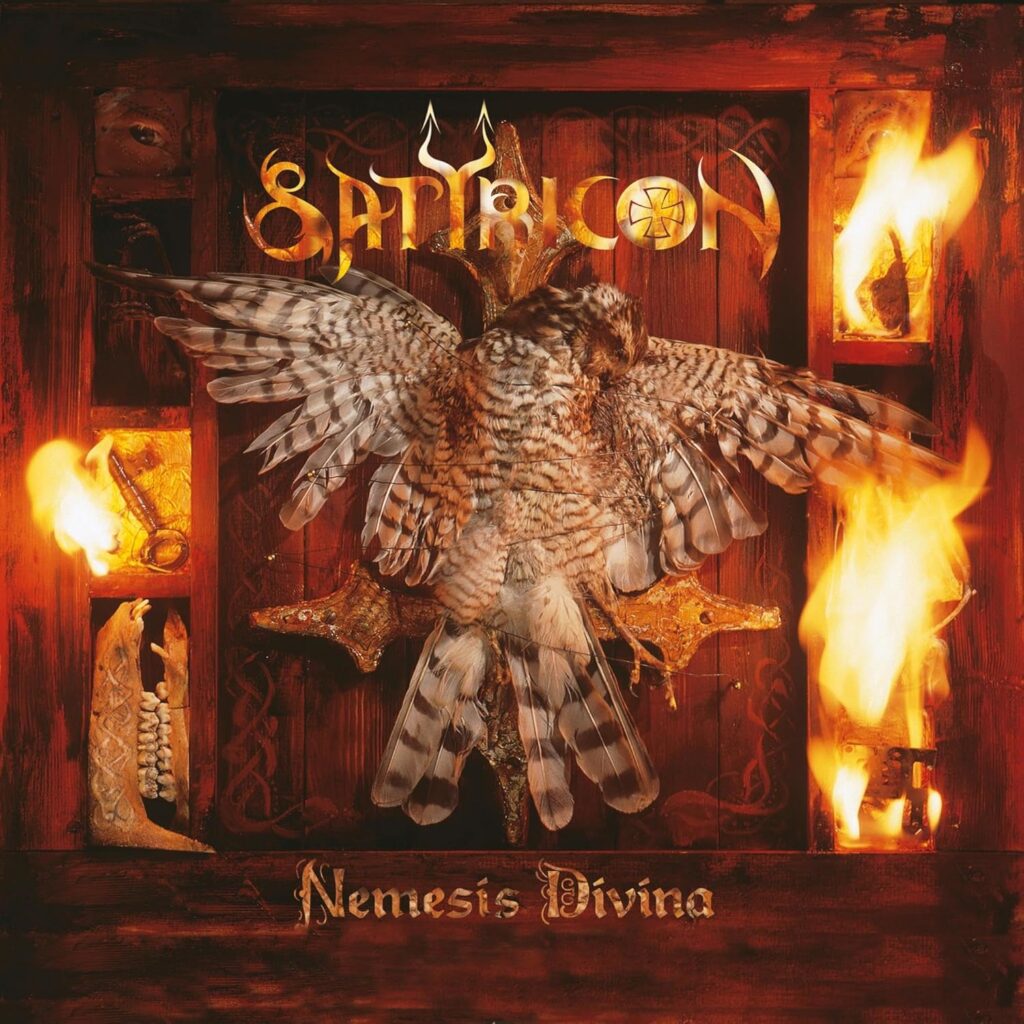Satyricon – Nemesis Divina
Reviewed by: Freya Ødegård
Review Score: 9

Satyricon’s Nemesis Divina is one of those albums that will forever stand as a cornerstone in the history of black metal. Released in 1996, this record helped cement Satyricon’s legacy as one of Norway’s most influential black metal bands, and it still holds up as an essential listen for anyone exploring the genre. Whether you’re a veteran of the scene or just dipping your toes into black metal, Nemesis Divina is an album that demands attention.
Satyricon was formed in 1991 in Oslo, Norway, by Satyr (Sigurd Wongraven) and Frost (Kjetil Haraldstad), two musicians who were instrumental in shaping the sound of Norwegian black metal. While many bands in the genre were focusing on raw aggression and lo-fi aesthetics, Satyricon introduced a more atmospheric and dynamic approach. Their early works, like Dark Medieval Times and The Shadowthrone, showcased a blend of cold black metal with medieval and folk influences, giving them a distinct sound in a scene that was rapidly growing.
But it was with Nemesis Divina that Satyricon truly broke through. The album not only solidified their position as black metal pioneers but also pushed the boundaries of what the genre could achieve. With its epic scope and rich atmosphere, Nemesis Divina stands out as a high point in the band’s career and in the evolution of black metal as a whole.
Let’s be honest—when you talk about Nemesis Divina, the first track that comes to mind is “Mother North.” This song is the epitome of Norwegian black metal, and I mean ekte norsk black metal. It opens with a haunting, almost cinematic melody that quickly shifts into a full-on black metal assault. Satyr’s vocals are raw and commanding, and Frost’s drumming is relentless. The midsection of the song has this grand, almost orchestral feel, and you can’t help but feel like you’re being transported into the cold, harsh wilderness of Norway. It’s no wonder this track has become an anthem for black metal fans around the world.
But Nemesis Divina is so much more than just “Mother North.” The album kicks off with “The Dawn of a New Age,” which sets the tone for what’s to come. Right from the start, you’re hit with this swirling, chaotic energy that’s both aggressive and atmospheric. There’s a sense of grandeur to the whole album, like Satyricon is telling the story of some long-lost era where gods walked the earth and chaos reigned. It’s dark, it’s mythological, and it’s absolutely epic.
One of my favorite tracks on the album is “Forhekset,” which translates to “bewitched” in Norwegian. This song has a more mid-tempo, groove-oriented feel compared to some of the other tracks, but it’s still packed with that signature black metal atmosphere. There’s something almost hypnotic about the riffing here, and it gives the track a ritualistic vibe that I can’t get enough of. Frost’s drumming, as usual, is tight and precise, but it’s the melodies that really stand out on this one.
Throughout the album, Satyricon strikes a perfect balance between the fast, chaotic elements of black metal and the slower, more atmospheric moments. Tracks like “Du Som Hater Gud” (“You Who Hate God”) showcase the band’s ability to shift between blistering tremolo-picked riffs and more melodic, contemplative sections. The lyrical themes on Nemesis Divina are steeped in misanthropy, mythology, and darkness—exactly what you’d expect from a black metal album born out of Norway’s cold, unforgiving landscapes.
I love how Satyricon isn’t afraid to embrace the grandiose side of black metal without losing any of the rawness that defines the genre. There’s a reason Nemesis Divina is still considered one of the genre’s defining albums. It captures the essence of black metal in its purest form while pushing the boundaries of what the genre can do.
Satyricon Nemesis Divina is a masterpiece that remains just as powerful today as it was when it was first released. From the iconic “Mother North” to the haunting melodies of “Forhekset” and “Du Som Hater Gud,” this album has everything that makes black metal so captivating. The production is sharp without being overly polished, the songwriting is ambitious, and the atmosphere is as cold and dark as a Norwegian winter.
For someone like me, growing up in Norway and being surrounded by the black metal scene, this album feels like a rite of passage. It’s impossible to listen to Nemesis Divina without feeling the weight of Norway’s musical and cultural history bearing down on you. Whether you’re here for the icy riffs, the relentless drumming, or the mythological themes, this album delivers on all fronts.
Skål to Satyricon for crafting an album that remains a vital part of black metal’s legacy. If you haven’t heard Nemesis Divina, you owe it to yourself to experience one of the genre’s finest moments.